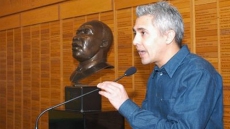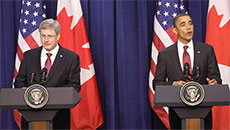After India signed a deal with Canada on uranium imports during Prime Minister Narendra Modi's visit to Ottawa, questions are being raised as to why it has taken Canberra so long to clinch a similar pact.
The powerful coal lobby in Austalia has also come under a scanner for the role it may have played in blocking uranium sale to an energy-starved India.
Even though Australian Trade and Investment Minister Andrew Robb said last weekend that the finishing line is in sight for supply of uranium to India, many experts are expressing doubts. Some of these sceptics blame the so-called Big Coal for pushing the finishing line further away.
The logic behind their analysis is understandable as the importance of coal to the Australian economy is immense. Around 200,000 people are employed in businesses dealing with coal. The value of this fossil fuel industry is estimated to be Aus $60 billion. This figure is huge for a country of 23 million people.
But the coal mining industry in Australia is facing a bleak future as international prices for fossil fuels continue to fall. A clearly discernible downturn in the Chinese demand for Australian coal has not helped. Add to this is the increasing global preference for renewable energy to the mix and not too bright a future emerges for the coal industry.
While there are 1,300 mining firms in Australia, production is dominated by very large firms such as BHP Billiton, Rio Tinto, Xtrata,Shell Chevron and Woodside Petrolium..
Australia hails the mining sector as a saviour of the economy. The country exported Aus $39.96 Billion worth of coal and Aus $79.67 Billion of iron ore. Coal industry has 220,000 people on its payroll or two percent of the total employed in the country. Development of mining has also relied heavily on foreign investments and has dominated the export earnings. In the past decade the rapid growth of China and India has made significant demand for the raw material.
India, with a chronic deficit of energy, has emerged as the possible saviour of the Australian coal mining industry.
In this context, it perhaps makes sense that big coal miners in Australia see uranium as a competitor to fuel Indian power plants. This is where the PR managers of the mega coal mining companies step in.
If anyone nursed doubts about the existence or money power of the Australian coal lobby, they were dispelled exactly a year back when the coal industry lobbying machine launched a PR campaign titled 'Australians for Coal' to fight the market slump. The media splurge was designed to, as one industry commentator aptly put, defend its increasingly tattered social licence and a fast depleting market.
It is estimated that the campaign cost touched Aus $100 million.
The Big Coal clout was also evident when Australian PM Tony Abbott appointed CEO of the world's second largest miner Rio Tinto Sam Walsh to the Australia-India CEO Forum. A number of big names in coal mining in both Australia and India have been included in the list.
It would, therefore, not come as a surprise that coal lobby could be working behind the scene to thwart the supply of uranium required by the Indian nuclear power plants.
It has been nearly eight years since the then Australian PM John Howard gave his nod to lift the ban on uranium export to India in August 2007. His Labor successor Kevin Rudd was quick to restore the ban saying India was not a signatory to the Nuclear Non-Proliferation Treaty (NPT).
The mandarin-speaking Prime Minister's close affinity with China was given as one of the reasons for reimposing the ban. Those knowing Australian politics reasonably well pointed out that Kevin Rudd came from Queensland - the state which is home to some of the world's largest coal mines.
Kevin Rudd's replacement Julia Gillard lifted the ban after a dramatic Australian Labor Party National Conference in December 2011.
Much water has passed under the bridge in the iconic Australian river Murray at Aubury Wodonga after that historic Labor Party concession, but the first shipment of uranium for India's 21 nuclear reactors still looks like a distant dream.
The delay can hamper Indian government's plans to increase power from the nuclear-powered plants from the current 6,000 megawatts (or three per cent of country electricity needs) to 45,000 megawatts by 2032.
When Prime Minister Narendra Modi visited Australia in November last year, it was hoped that the contentious issue of uranium supply would be sorted out within a matter of few months.
The precious yellow coloured nuclear fuel also figured in the joint statement issued by the two leaders of the leading Indian Ocean rim economies. But, in spite of the grand statements, Indian nuclear power plants are yet to get the fuel from Australia.
The finger-pointing at the coal lobby, which includes the Minierals Council of Australia, the NSW Minerals Council (NSWMC) and the Queensland Resources Council (QRC), has taken a new meaning as the Indian multinationals GVK and Adani Mining have joined their ranks. Adani Mining owner Gautam Adani is said to be close to the prime minister Modi. How this equation will work out on the uranium question is yet to be seen.





